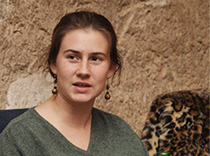Almost four times the size of France, but with a population three times smaller than that of the city of Plzeň, Greenland is not a country that often makes the headlines. Part of the Kingdom of Denmark since 1721, this small Arctic country is now self-governed after a long process that started almost 60 years ago. On Tuesday, the 19th November the Scandinavian Section of the Department of Germanistic Studies at the Faculty of Arts at Charles University hosted a talk with Ms Tove Sovndahl Gant, head of the Greenland Representation in Copenhagen. Titled “Greenland – a Self-governed Country in the Arctic” Ms Gant gave a brief history of the devolution process in Greenland and gave an overview of the plans for the country’s future.
Danish colonists first arrived in Greenland in 1721 and came mainly to the island as missionaries and government officials. In contrast to many of the other colonies of European Empires Greenland was never settled by the Danish, and the relationship between colony and empire was based mostly on trade. Thus Greenland to a great extent was left behind by the developments of continental Europe, and by the 1950s was suffering problems of underdevelopment and poverty. In a bid to improve conditions on the Island Denmark made Greenland an official constituency instead of a colony in 1953 and in the 50s and 60s made many attempts to develop Greenland, by increasing urbanisation, creating Open Water Towns and building modern housing, amongst other things. This process was controlled and implemented mainly by the Danish while the Greenlanders were encouraged to continue fishing and the young people encouraged to seek an education. Feelings of alienation and helplessness, as well as resentment of what they perceived as intrusion into their fisheries by other EU states after joining the European Economic Community (EEC) grew and were leading to many social problems. Calls for self-determination led to setting up a Commission on Home Rule in 1973, and following a referendum in 1979 Greenland’s first Home Rule government was established, with competency in 16 different policy areas.
Home Rule progressed much faster than anticipated in Greenland according to Ms Gant, and by 1994 they had exhausted the potential of the 1979 Home Rule Act. They had also by this time withdrawn from the EEC (the only country, to date, that has done so). Another commission was set up, and in 2008 another referendum resulted in a yes vote in favour of Self- Government. And so on June 21, 2009, their national day, the Greenland Self-Governance commenced. This meant competency in 33 areas, including immigration, justice and natural resources, as well as official status for their language and the right to be recognised as an independent state.
However self-government also brought new challenges for Greenland, a country that has been economically dependent on another state for centuries. For every new policy competency it takes over from Denmark it must be able to fund it itself, but with every individual competency costing potentially billions of Danish krone (DKK) it is no mean feat. And other than the need to reduce dependency on Danish block grants, Greenland also faces an aging population, unimaginable infrastructure challenges, the need to raise the standards of its welfare state, as well as improving wage equality. It seems however to be facing these problems with determination and quiet optimism. Ms Gant described the process by which they hope to reduce their dependency on the block grant they receive yearly from Denmark. The country has many untapped mineral resources, including gold, iron, rubies, titanium, vanadium and Rear Earth Elements. Greenland hopes to increase profits from this sector, and for every year when they make over 75mn DKK the surplus is to be divided in two, with half being kept by Greenland and the other half going to Denmark against the block grant. It is hoped that this proportion will continue to grow until it is outsizes the block grant, leading to a re-negotiation over the funding of Greenland by Denmark. There is also optimism for the future of the fishing industry in Greenland. Accounting for around 90% of exports, according to Ms Gant they are keeping an eye on whether fish like haddock start swimming further north, and the opening of a North Sea Trade Road could provide many benefits to the Island.
In a time where the question of devolution, self-government and independence is one being discussed in many European states, the case of Greenland is certainly an interesting one. “Greenland, A Self-Governed Country in the Arctic” was certainly a fascinating talk, shedding light on an intriguing, if rather neglected topic.
Elan Grug Muse is in her second year studying for a BA in Politics at the University of Nottingham, and is studying for a year at the Faculty of Social Sciences in Charles University, Prague. She is interested in international politics, music and literature, and was motivated to write for iForum because it offered a good opportunity to improve her journalism skills.
|
















